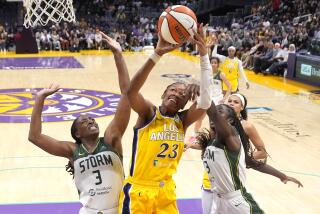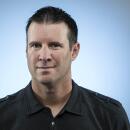His Methods Are Tirade-and-True
- Share via
The Dallas Mavericks had found their coach of the future, a hard-charging guard respected by many but never really appearing on top-10 lists of all-time greats.
Sidney Moncrief, a former All-Star with the Milwaukee Bucks in the 1980s, was the chosen one, hand-picked a few years ago by Coach Don Nelson as his future replacement ... until he willingly left his post as a Mavericks assistant in 2003 to open a second car dealership in Arkansas. (Translation: Make good money without spending sub-zero winter nights in Detroit and Cleveland.)
So the Mavericks came up with another candidate in what can now be called a fairly solid Plan B.
Avery Johnson was the little engine that couldn’t, or so he was often told, an undrafted point guard in 1988 who was too short (5 feet 11) and too inconsistent with his outside shot (did his range extend beyond 12 feet?) to ever make a difference.
Johnson got the last laugh as a player -- he ended up hitting the winning shot, an 18-footer from the baseline, to clinch the San Antonio Spurs’ first NBA championship -- and he could now afford a chuckle or two as the Mavericks’ coach, although the ultra-serious Johnson rarely chooses to do so.
He seethes almost as often as he breathes, lighting into players regardless of size or stature, be it five-time All-Star Dirk Nowitzki or young point guard Devin Harris.
He stares, he scolds and, well, he succeeds.
In his first full season as the Mavericks’ head coach, Johnson, 41, was the runaway winner of the coach-of-the-year award, guiding the Mavericks to one of their best seasons in an unremarkable 26-year history and bringing them to their first NBA Finals appearance.
“Obviously I’m not the happiest guy to work with every day, but they tolerate me,” Johnson said recently. “They know that I’m trying to get the best out of them. We have a lot of fun times together too. You [media] guys don’t seem to report that, but we do have a lot of fun.”
His love ‘em and lambaste ‘em style has worked throughout the season, be it a late-March tirade in Orlando that echoed off the shower area and through locker-room walls or, more recently, an animated film session the day after Nowitzki scored only 11 points in Game 4 of the Western Conference finals.
Nowitzki responded by scoring 50 points in Game 5 against Phoenix. The Mavericks won the series in six.
“He can be tough on players,” Nowitzki said. “But he’s always pushing us forward and trying to get the best out of his team. He’s been doing a great job all season long. Obviously, whatever he did in the film session worked.”
As a player, Johnson was a grind-it-out guard who would drive to the basket instead of settling for an outside shot. His touch was abysmal when he embarked on a frequent-flier career that brought him to five teams -- Seattle, Denver, San Antonio, Houston and Golden State -- before he began his second tour with the Spurs in 1994.
He ultimately straightened out his shot and stayed with the Spurs through the 2000-01 season. He became their career leader in assists and earned the nickname “The Little General” for his vocal leadership skills.
His shot in the waning seconds against New York in Game 5 of the 1999 NBA Finals brought San Antonio its first championship, and teammates and coaches called Johnson the heart of the team -- not veteran center David Robinson or a young Tim Duncan.
Fortunately for the Mavericks, Johnson did not finish his career with the Spurs. There were still brief stops in Denver (again), Golden State (again) and, finally, in Dallas. He came to training camp in October 2004 with the Mavericks in the rare player-coach role but announced his retirement as a player when the exhibition season ended a few weeks later.
Nelson, who was 64 at the time and in his eighth season with the Mavericks, had a hand in it, convincing Johnson to end a productive 16-year career.
“I think he realized that it was over for him [as a player] but it was hard for him to just turn it off,” Mavericks assistant coach Del Harris said. “A day or two later, he resolved it and said, ‘You’re right, this is what I should do.’ ”
By December, Johnson began running practices, with Nelson and Del Harris interjecting a few points here and there.
Then came March 19, 2005.
Nelson had just missed a few weeks because of shoulder surgery and said he saw “a little slippage” in the team upon his return.
“The team is just responding better to Avery at this point,” he said the day he resigned.
It wasn’t tough to find a replacement.
“When Nellie decided not to go forward, I went around the locker room to the different guys and talked to them and they all said, ‘Mark, this is a no-brainer,’ ” owner Mark Cuban said recently. “[Jerry Stackhouse] said, ‘This guy is amazing.’ Dirk said, ‘The General is awesome.’ ”
The job became Johnson’s.
“They were already accustomed to hearing his voice and he had been an integral part of the coaching process,” Harris said. “I don’t know what to compare it to. I guess a long engagement, and then you finally get married.”
The Mavericks were left at the altar that season, losing to Phoenix in the Western Conference semifinals, but their progress this season has been tangible.
Nelson was an offense-minded coach, but Johnson preferred to see the Mavericks thrive on defense. Johnson geared practices more toward defense when he took over and the Mavericks held opponents to a franchise-low 93.1 points a game this season.
It has worked in the clutch, too.
In Game 7 of the West semifinals, they held San Antonio to two-for-10 shooting in overtime. In Game 6 of the West finals, they held Phoenix to 12 points during a game-turning 12-minute stretch of the second half.
They begin the NBA Finals against Miami on Thursday, which makes Johnson pleased. Maybe.
More to Read
Go beyond the scoreboard
Get the latest on L.A.'s teams in the daily Sports Report newsletter.
You may occasionally receive promotional content from the Los Angeles Times.











